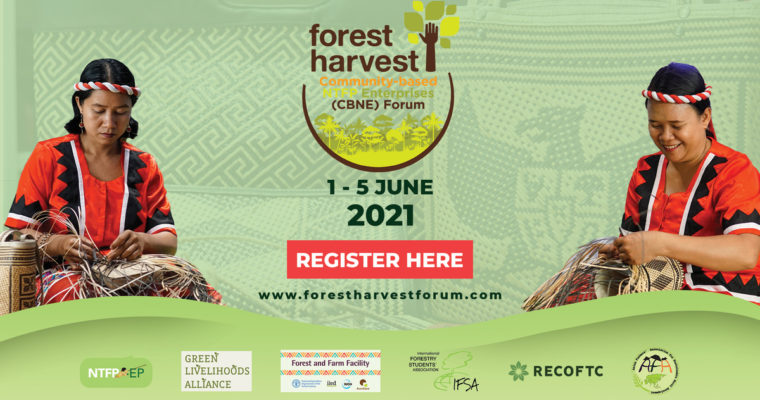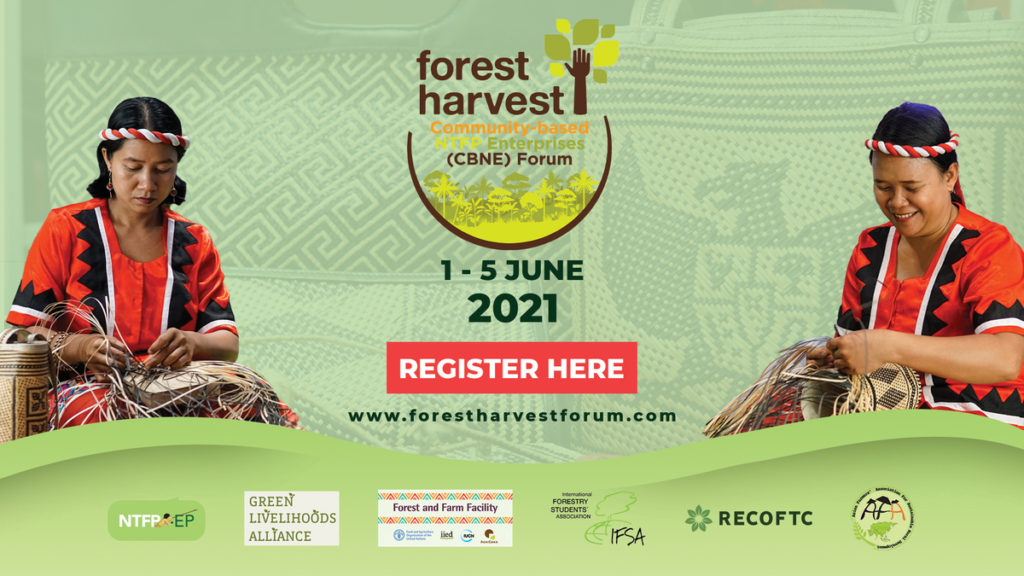MANILA, 27 May 2021 — Enterprises managed by rural and indigenous communities will take the spotlight for the inaugural Forest Harvest CBNE Forum taking place June 1 through 5 to highlight their untapped potential in contributing to forest conservation and community well-being.
Known as “community-based non-timber forest product enterprises” (CBNEs), these groups use materials gathered from their local forests to create market products like food, drinks, medicines, fabrics, handicrafts, accessories, and others. In turn, a portion of their income is then used to fund conservation efforts that protect the forest they live and harvest in.
The five-day online forum is co-organized by the Non-Timber Forest Products – Exchange Programme (NTFP-EP), the Green Livelihoods Alliance, the Forest and Farm Facility, the International Forestry Students’ Association, RECOFTC, and the Asian Farmers’ Association for Sustainable Rural Development.
“As millions of people in Asia depend on non-timber forest products for their livelihood, CBNEs help bring important natural products to the food, furniture, medicine, and cosmetic industries,” said Crissy Guerrero, senior advisor for strategic programmes of NTFP-EP Asia.
“Even before the pandemic, CBNEs were already struggling to access markets, learn skills, and upgrade their systems and technologies. The pandemic has not made it easy for them, but with this online forum, we wish to provide the opportunity to continue to share knowledge, connect sectors, and provide market opportunities for CBNEs through a suite of interactive and innovative activities,” she added.
Featuring expert speakers in the field of community forestry and enterprise development, the Forest Harvest CBNE Forum will host a variety of sessions focusing on three key streams: Capacity, Connectivity & Creativity, and Conducive Environment.
The Capacity stream features talks, roundtable sessions, coaching clinics, master class sessions, and a storytelling competition. The Connectivity & Creativity stream explores interactive problem solving through a panel talk show, a branding clinic, and a hackathon competition. Lastly, the Conducive Environment promotes policies and research findings that support CBNEs through talks and sessions with ASEAN bodies on protocols and government policies.
“Events like these help us expand our partnerships, gain recognition and give us opportunities to promote the traditional products made by cooperatives like ours,” said Emelly Lanzon, manager of Handicrafts of Aklan Multi-Purpose Cooperative (HAMPCO) in Aklan, Philippines. HAMPCO uses the income from their loom woven products to advocate for women empowerment, fair trade practices, and environmental sustainability.
Frank Roy Ribo, President of the Kalipunan ng Maliliit na Magniniyog ng Pilipinas (KAMMPIL), an agricultural cooperative based in Leyte, Philippines, also said that “the CBNE Forum is a great venue for knowledge sharing, learning from the experiences of others, and exploring adaptation ideas towards building a resilient small-scale enterprise in the face of changing climate and markets.”
Cresente Paez, chief executive officer of Philippine Family Farmers’ Agriculture Fisheries Forestry Cooperatives Federation, said that the forum provides an opportunity for cooperatives and enterprises to learn best practices from other groups as they face disruptions in the supply chain caused by the COVID-19 pandemic that continue to affect many small-scale farmers.
“Most of our commodity value chains are broken because of a lack of timely information, which adversely affects the quality and productivity of farms. We are eager to know about digitizing the farm operations and connecting to the market,” Paez added.
Participants from indigenous and rural communities, CBNE practitioners, policymakers, and private sector groups in the field of natural products are invited to participate in the forum. The youth, local organizations, researchers, scientists, non-government organizations, and national/international donors are also welcome to participate and represent their sectors.
Registered participants can redeem vouchers for free products from partner CBNE vendors in the forum. Students and members of CBNEs can register for the forum free of charge. Aside from English, interpretations for Thai, Filipino, Bahasa Indonesia, Khmer, and Vietnamese will be provided.
To learn more about the Forest Harvest CBNE Forum and register as a participant, visit www.forestharvestforum.com.





Comments are closed